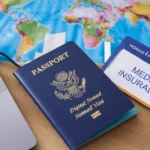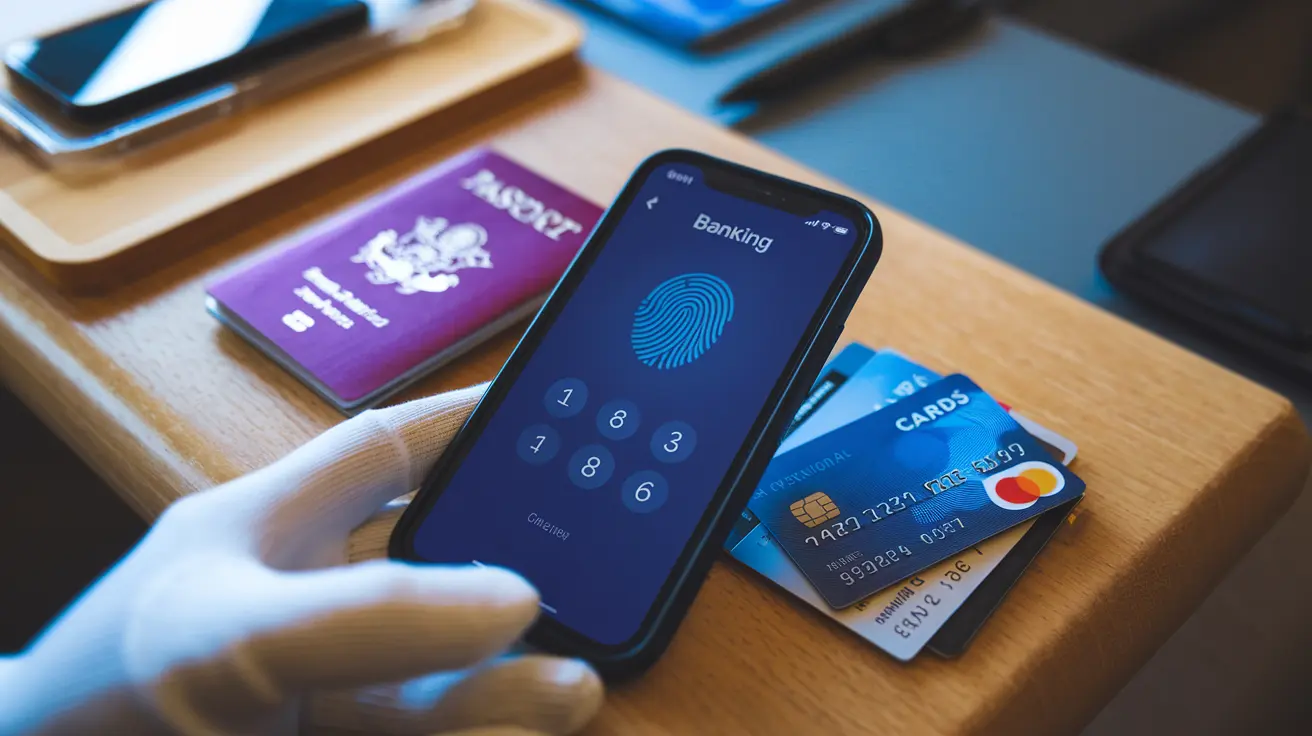Protect Your Wealth Using Digital Banking Tools
When suddenly, your banking app notifies you of an unauthorized transaction. In that moment, the freedom of international living collides with the harsh reality of digital financial vulnerability. As of June 2025, cybercriminals are increasingly targeting travelers and expats, knowing they’re navigating unfamiliar financial territories while managing wealth across borders.
The days of stashing cash under hotel mattresses are long gone, but so is the simplicity of banking from your hometown branch. Today’s global citizens face a complex web of challenges: unsecured public Wi-Fi networks that practically invite hackers to dinner, sophisticated phishing attempts designed specifically for travelers, and geo-blocking that can suddenly cut you off from your funds when you need them most. 🌍 But here’s the good news: with the right digital banking tools and security practices, you can create an invisible shield around your wealth that works seamlessly across continents.
In this comprehensive guide, we’ll explore everything from essential security features your international banking apps must have to advanced wealth protection strategies using concepts like “geo-arbitrage” and “flag theory.”
You’ll discover how to implement VPN protection for your financial activities, master daily security practices that take just minutes but save fortunes, and build a robust defense system against the most common digital threats targeting global citizens. Whether you’re planning a two-week vacation or embarking on a full-fledged expat journey, protecting your financial foundation is as crucial as safeguarding your passport—and we’re about to show you exactly how to do it.
Understanding Modern Financial Risks for Travelers and Expats
In today’s interconnected world, travelers and expats face unique financial risks that require modern solutions. As digital banking becomes essential for global citizens, understanding these risks is the first step toward effective wealth protection.
Shifting from Traditional Wealth Storage Methods
The digital era has transformed how we manage our finances while abroad. Traditional methods of carrying cash or traveler’s checks are increasingly obsolete, replaced by digital banking tools that offer greater flexibility and security. This shift is necessary as physical currency makes travelers vulnerable to theft and loss while abroad. Instead, secure digital banking platforms allow access to funds without the risks associated with carrying large sums of cash.
Risks of Keeping Large Sums in Banks While Abroad
When traveling internationally, keeping significant amounts in foreign banks presents several challenges:
- Financial fraud risks: Card cloning at unfamiliar ATMs threatens travelers’ financial security. As noted by security experts, these risks are amplified in unfamiliar environments.
- Cybersecurity vulnerabilities: Public WiFi networks in airports, hotels, and cafes are prime targets for cybercriminals who can intercept banking credentials and personal information during transactions.
- Device theft concerns: Lost or stolen devices containing banking apps and financial information can lead to unauthorized access to accounts and identity theft if proper security measures aren’t in place.
Regular monitoring of bank activity and immediate reporting of suspicious transactions are crucial steps in protecting your wealth while traveling internationally.
Introduction to Geo-Arbitrage and Flag Theory Concepts
Global citizens are increasingly adopting sophisticated approaches to international wealth management:
- Geo-arbitrage: This strategy involves taking advantage of different cost-of-living standards and banking regulations across countries to optimize financial resources and wealth protection.
- Flag theory: This concept suggests distributing your financial presence across multiple jurisdictions to minimize risk exposure and optimize tax efficiency, creating resilience against country-specific financial disruptions.
Understanding these concepts helps travelers and expats build robust financial systems that aren’t dependent on a single country’s banking infrastructure or regulations.
With these modern financial risks in mind, implementing proper digital security becomes essential. Next, we’ll explore the “Essential Security Features for International Digital Banking” that can protect your wealth from these vulnerabilities while maintaining convenient access to your funds from anywhere in the world.
Essential Security Features for International Digital Banking
Now that we understand the financial risks travelers and expats face, it’s crucial to identify the security features that make digital banking safe for international use. The global banking landscape varies significantly in terms of security measures and accessibility, especially for high-net-worth individuals managing assets across borders.
Banks with Strong Encryption and Secure Login Systems
When selecting an international banking partner, encryption and login security should be top priorities. Countries like Luxembourg, Singapore, and Switzerland have established reputations for robust banking security protocols. Singapore, in particular, hosts several of the world’s safest banks with state-of-the-art encryption standards. Similarly, German banks are noted for their exceptional security measures, with one German institution recognized as the safest bank globally.
For Americans traveling abroad, it’s worth noting that FATCA regulations have made some secure European banks less accessible. Despite these challenges, institutions in countries like Canada, the Netherlands, and South Korea offer strong encryption and multi-factor authentication systems that protect wealth during international transactions.
Real-time Alerts and Transaction Notifications
Immediate notification systems are essential for detecting unauthorized activity while abroad. The safest international banks offer comprehensive alert systems that notify you instantly of:
- Transactions above customized thresholds
- Login attempts from unfamiliar locations
- Currency conversions and international transfers
- Account setting changes
Banks in Norway and Sweden complement their secure systems with sophisticated real-time monitoring that can detect unusual patterns based on your location and spending habits. This proves particularly valuable when traveling across multiple countries where transaction patterns naturally vary.
Responsive Customer Support for Cross-Border Issues
When banking issues arise abroad, time zone differences and language barriers can complicate resolution. The best international banks offer:
- 24/7 multilingual support accessible from anywhere
- Dedicated teams for international client concerns
- Multiple contact channels (secure messaging, phone, video)
- Emergency protocols for compromised accounts
French and Dutch banks, while operating in high-tax environments, often provide exceptional cross-border support services. Singapore’s banking institutions are particularly noted for their responsive international client services, making them preferred choices for global citizens managing significant assets abroad.
With these essential security features in place, you’ll be better equipped to protect your wealth while traveling. Next, we’ll explore specific digital threats you might encounter abroad and how to safeguard against them effectively.
Protecting Against Common Digital Threats While Traveling
Now that we’ve explored essential security features for international digital banking, let’s examine how to defend against the common digital threats you might encounter while traveling abroad that could put your wealth at risk.
A. Identifying and avoiding phishing scams
Phishing attempts remain one of the most prevalent threats to financial security while traveling. These scams typically involve fraudulent emails, messages, or websites designed to steal your banking credentials. To protect yourself:
- Be skeptical of unexpected communications asking for financial information
- Verify the legitimacy of banking communications through official channels
- Avoid clicking on suspicious links in emails or texts, especially those creating urgency
- Check for spelling errors or unusual sender addresses that may indicate fraudulent activity
Remember that legitimate financial institutions will never ask for your complete password or PIN via email or text message.
B. Securing your devices with antivirus software
Before departure, ensure all your devices have updated antivirus protection:
- Install reputable antivirus software on all devices you’ll use for financial transactions
- Update all software to include the latest security patches
- Enable automatic security updates whenever possible
- Consider specialized mobile security applications for additional protection
As noted in Tiffany Wax’s cybersecurity recommendations, limiting the number of devices you bring and ensuring they’re properly secured can significantly reduce your risk exposure.
C. The dangers of public Wi-Fi for financial transactions
Public Wi-Fi networks present significant risks for digital banking abroad:
- Avoid conducting financial transactions on public Wi-Fi networks
- Disable auto-connect features on your devices to prevent automatic connections to unknown networks
- Verify the legitimacy of any network before connecting
- If you must use public Wi-Fi, consider setting up a VPN first
These networks are particularly vulnerable to “man-in-the-middle” attacks where hackers intercept data between your device and the destination server. Instead, use your mobile data plan or a secure, private connection for banking activities.
With these protective measures in place, your next step should be implementing specific digital tools designed for banking security abroad. In the next section, we’ll explore the critical digital tools that can provide additional layers of protection for your financial activities while traveling internationally.
Critical Digital Tools for Banking Security Abroad
Now that we understand the common digital threats travelers face, let’s explore the essential digital tools that can significantly enhance your banking security when managing finances abroad.
Multi-factor authentication systems for overseas access
With financial institutions facing approximately 700 cyber incidents per week, multi-factor authentication (MFA) has become an indispensable security measure for international banking. Advanced MFA systems verify your identity through multiple verification layers, making unauthorized access significantly more difficult when banking from foreign locations. Many banks now offer sophisticated MFA options that comply with standards set by regulatory bodies like the Federal Financial Institutions Examination Council (FFIEC) and the European Banking Authority (EBA), ensuring your wealth remains protected regardless of your global location.
Password managers for secure credential storage
When traveling internationally, maintaining unique and complex passwords for your digital banking accounts is crucial for wealth protection. Professional password managers provide centralized security management for your banking credentials, automatically generating strong passwords and securely storing them. This eliminates the need to remember multiple complex passwords while abroad, reducing the risk of using weak or repeated passwords that could compromise your financial security. The best password managers also include real-time detection of security misconfigurations, adding an extra layer of protection for your digital banking activities.
Hardware authenticators like Yubikey for preventing fraud
Hardware authentication devices like Yubikey represent one of the most advanced wealth protection tools for international travelers. These physical security keys provide an additional verification factor that cannot be replicated through digital means alone. As part of a comprehensive cybersecurity solution for secure international banking, hardware authenticators effectively counter sophisticated phishing attempts and credential theft—threats that have become increasingly common for travelers and expats managing wealth digitally. Many global financial institutions have integrated support for these devices, providing 24/7 protection for your financial assets, even when accessing accounts from unfamiliar networks abroad.
With these critical digital tools properly implemented, you’ll have established a robust foundation for your banking security while traveling. Next, we’ll explore how implementing VPN protection for international banking can further enhance your financial security by encrypting your connection and masking your location when accessing banking services from foreign countries.
Implementing VPN Protection for International Banking
Now that we’ve examined the critical digital tools for banking security abroad, let’s focus on one of the most powerful protections for your wealth while traveling: Virtual Private Networks (VPNs). When accessing your financial accounts from foreign countries, a VPN serves as your first line of defense against various digital threats.
How VPNs mask your location and encrypt connections
VPNs create a secure tunnel for your internet connection, offering two critical protections for international banking:
- Location masking: By connecting to a VPN server in your home country, you can make your banking platform believe you’re accessing it domestically. This helps prevent automatic security blocks that might trigger when your bank detects foreign access.
- Data encryption: VPNs employ uncrackable encryption protocols that transform your sensitive financial data into indecipherable code during transmission. This prevents hackers on public Wi-Fi networks from intercepting your banking credentials or transaction details.
The process is straightforward: you first connect to your chosen VPN server to establish a secure connection, then proceed to log in to your banking portal with significantly enhanced protection.
Top VPN options for expats (NordVPN, ProtonVPN, ExpressVPN)
Based on security features, server speed, and customer support, these VPN services stand out for wealth protection while traveling:
- NordVPN: Consistently rated highest for online banking security, NordVPN offers robust encryption protocols and excellent speeds. They provide a risk-free 30-day trial for travelers to test their service before committing.
- ExpressVPN: Known for exceptional device compatibility and reliable connections in countries with internet restrictions, making it ideal for global citizens managing their finances abroad.
- ProtonVPN: While not extensively detailed in our reference, this security-focused VPN is worth mentioning alongside other top providers like Surfshark, IPVanish, CyberGhost, and PrivateVPN, which all offer strong security features for digital banking abroad.
When selecting a VPN for secure international banking, avoid free VPN services. These often compromise on security and privacy, potentially putting your financial data at risk. A paid service with a proven security track record is essential for proper wealth protection.
Overcoming geo-blocking restrictions on banking platforms
Many banking institutions implement geographical restrictions as a security measure, which can inadvertently lock out legitimate users traveling abroad. VPNs provide a solution:
- Connect to a VPN server in your home country before accessing your banking platform
- If access issues persist, clear your browser cookies and cache
- For continued problems, contact your VPN’s customer support for specialized assistance
This approach allows you to maintain secure access to your financial accounts regardless of your physical location, ensuring continuous wealth management capabilities while traveling internationally.
With robust VPN protection in place for your international banking needs, we’ll next explore the daily security practices for international wealth management that complement your technical safeguards and provide comprehensive protection for your assets abroad.
Daily Security Practices for International Wealth Management
Now that we’ve covered how to implement VPN protection for your international banking activities, let’s focus on the daily security practices that are essential for managing your wealth while abroad. Just as millionaires maintain disciplined habits for financial success, travelers need consistent security routines to protect their digital financial assets.
Regular Account Monitoring and Alert Systems
Frugality with your attention to detail pays dividends when it comes to financial security abroad. Establish a routine of checking your accounts daily, much like how successful wealth managers continuously monitor their investments. Set up comprehensive alert systems through your digital banking platforms that notify you of:
- Any transactions above a certain threshold
- Account logins from new devices or locations
- Changes to account settings or personal information
- Currency conversions or international transfers
These alert systems function similarly to how investment professionals track market highs and lows, allowing you to be proactive rather than reactive to potential security breaches.
Device and Software Update Protocols
Just as continuous learning is essential for staying competitive in financial markets, keeping your devices and software updated is critical for digital banking security Establish a regular schedule for:
- Updating your mobile banking apps
- Installing operating system updates promptly
- Refreshing security software definitions
- Reviewing and updating passwords for financial accounts
Think of these updates as your financial education in the digital realm—they equip you with the latest protections against evolving threats, similar to how investors stay informed about changing market conditions.
Review Processes for Suspicious Activities
Developing a systematic approach to reviewing suspicious activities mirrors the goal-setting practices of successful wealth managers. Create a clear protocol for when you notice unusual account activity:
- Document the suspicious transaction or notification
- Contact your financial institution through secure channels
- Consider temporarily freezing accounts if traveling in high-risk areas
- Maintain records of all communications regarding the issue
This disciplined approach to security reviews reflects the same careful consideration that goes into diversified investment strategies, protecting your wealth from multiple angles.
With these daily security practices in place, you’ll be well-prepared to move on to more advanced wealth protection strategies for global citizens, which we’ll explore in the next section. These advanced techniques will build upon the foundation of daily habits to create a comprehensive security framework for your international financial activities.
Advanced Wealth Protection Strategies for Global Citizens
Now that we’ve explored daily security practices for managing your wealth internationally, it’s time to delve into more sophisticated strategies that global citizens can employ to protect their assets. While digital banking tools provide immediate security, structural approaches to wealth protection offer long-term safeguards against various financial risks.
A. Structuring assets outside your name
One powerful wealth protection strategy involves legally structuring assets outside your personal name. This approach creates a separation between you and your wealth, adding a significant layer of protection. When properly implemented, this strategy can:
- Reduce your visible financial profile while traveling
- Create legal barriers against potential claims
- Maintain privacy regarding your total wealth holdings
- Provide continuity of asset management even when you’re in transit
This structure must be established with meticulous planning and professional guidance to ensure compliance with all relevant tax laws. The goal isn’t to hide assets but to organize them in legally recognized structures that offer enhanced protection.
B. Utilizing offshore accounts and trusts
Offshore financial structures can be valuable components of international wealth protection. Various jurisdictions offer different advantages:
- Anguilla and Nevis: Known for robust legal protections and strong privacy policies
- Cayman Islands: Recognized for corporate advantages and sophisticated banking infrastructure
- Isle of Man and Belize: Offer balance of protection, privacy, and reasonable costs
Offshore trusts generally provide superior asset protection compared to other structures. International Business Companies (IBCs) and Private Interest Foundations (PIFs) offer additional options with unique benefits including operational control and governance flexibility.
Advanced strategies include:
- Diversifying assets across multiple jurisdictions
- Creating multi-layered protection structures
- Holding real estate through offshore entities
C. Balancing privacy concerns with compliance requirements
The challenge for global citizens is maintaining privacy while ensuring full legal compliance. The Foreign Account Tax Compliance Act (FATCA) and other international regulations impose specific reporting requirements with severe penalties for non-compliance.
Key compliance considerations include:
- Complete and accurate reporting of offshore accounts
- Understanding the specific requirements of your home country
- Recognizing that privacy doesn’t mean secrecy from legitimate authorities
- Maintaining detailed records of all international financial activities
The regulatory landscape for international finance is complex and constantly evolving. Professional assistance is essential for navigating these complexities, as errors in planning or compliance can result in significant financial penalties.
For global citizens seeking to protect their wealth while maintaining digital banking security abroad, these advanced strategies complement the technological safeguards discussed earlier. The combination of proper digital security practices and sound structural wealth protection creates a comprehensive shield for your financial resources as you travel and live internationally.

Safeguarding Your Financial Future While Exploring the World
Protecting your wealth in an increasingly digital and globally connected world requires vigilance, knowledge, and the right tools. As we’ve explored throughout this guide, modern travelers and expats face unique financial risks that can be mitigated through robust digital banking security practices. From implementing strong encryption and multi-factor authentication to utilizing VPNs and adopting daily security habits like avoiding public Wi-Fi for transactions, these protective measures are as essential as safeguarding your passport while abroad.
Conclusion
The journey toward comprehensive wealth protection is ongoing in our rapidly evolving digital landscape. By applying the strategies outlined in this guide—from selecting banks with advanced security features to structuring assets thoughtfully through offshore accounts and trusts—you can navigate international waters with confidence. Remember that protecting your financial security is an investment in your freedom to explore the world without compromise. Take action today by implementing these security measures, and your future self—enjoying both financial security and global mobility—will thank you.








